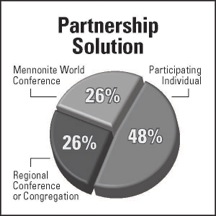This week, we are sharing several reflections from participants on the October 2014 “Come and See” tour to Israel and Palestine. While Joy Sutter participated in the spring 2014 tour to Israel and Palestine, we wanted to include her reflections, which were shared with her fellow Mennonite Church USA executive board members at their June 2014 meeting.

“Come and see” were the prophetic words of an amazing journey I experienced with other Mennonite Church USA leaders in Israel-Palestine this spring. This simple invitation, to come and see, changed my worldview of the people, the politics and the pictures that I had formed in my mind prior to my visit. I always knew there was conflict happening in the Middle East, but until I was able to see it in person, I did not truly understand it, and it did not penetrate my soul.
I needed to come and see for myself so that I could better understand that the conflict in Israel-Palestine is:
- both ancient and modern. It is deadly serious, and it is silly.
- religious and secular.
- fought with words, weapons and incorrect information presented in Western media.
- about land, the air above it and the water below it.
- about hoarding water, tearing down olive trees and building separate roads for Israelis to return to their settlement homes.
- about 430 miles of a 20-foot-high wall with electrical fencing.
- about watchtowers, tear gas, young Palestinians being detained and thrown into jail, interrogation and humiliation.
I heard the words of Jeremiah all the more clearly when he said, “They say peace, peace, when there is no peace” [6:14], and was reminded of Psalm 24:1: “The earth is the Lord’s and all that is in it, the world and those who live in it.”
A closing prayer
Leader: We pray for laborers who cannot enter their place of work. We pray for youth and young adults who are losing hope for their future. We pray for mothers who are fed up with the bloodshed and killing and the constant use of military might. We pray for families who have lost loved ones.
Group: Lord, in your mercy, hear our prayer.
Leader: We pray that you would open the eyes of the world—of Israelis, of Palestinians, of Americans and Canadians—to this injustice. Help the world to see that the security and freedom of one people depends on the security and freedom of others.
Group: Lord, in your mercy, hear our prayer.
Leader: We pray for politicians, that they may realize that the security and peace we all long for will not come from the use of military force, but by assuring justice for all. Help us to be bold to speak for peace achieved through nonviolence as the only way for all peoples to work together for an equitable and just future.
Group: Lord, in your mercy, hear our prayer.
Leader: God, you have called us to be followers. Give us wisdom. Free us from hatred and bitterness. Fill us with agape love and a passion for justice, so that we might respect the rights and dignity of all. Help us to see your divine image in everyone.
Group: Lord, in your mercy, hear our prayer.
All: And all God’s people say, “Amen.”
Joy Sutter, of East Norristown, Pennsylvania, is a member of the Mennonite Church USA executive board. This piece originally appeared in “On the Way,” a publication of Mennonite Church USA. Reposted with permission.











